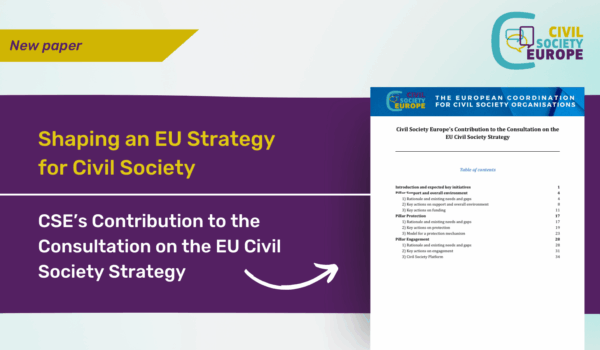CSE’s Contribution to the Consultation on the EU Civil Society Strategy
The EU Civil Society Strategy represents a timely and much needed opportunity for strengthening the support to European civil society and safeguarding civic space by providing a coherent, long-term framework. This is made more necessary by the growing pressure faced by the sector as a whole, from legal and administrative barriers to increasing narratives against civil society at both the national and the EU level. This delegitimisation not only threatens the very existence of civil society organisations (CSOs), but also is increasingly eroding EU values such as participation, pluralism, and solidarity. In addition to this, many CSOs and some institutional actors have advocated heavily for such a strategy, as seen in our 2022 letter which was supported by over 340 organisations.
This is why CSE warmly welcomed the inclusion of this strategy into the European Commission’s 2025 work programme. But how can this strategy be shaped by civil society’s indispensable input?
The Commission consults citizens and stakeholders for their views on initiatives via ‘public consultations’, a critical opportunity for the public to contribute to the decision-making process. In our contribution to the public consultation organised by the European Commission, prepared by CSE including through our Working Group on Civic Space and Fundamental Rights, we outline the steps needed to build a strategy that genuinely delivers for civil society. The proposed strategy will be built on three pillars: ‘Support and overall environment’, ‘Protection’, and ‘Engagement’. We address each pillar individually, shining a spotlight on the current situation and challenges faced by civil society actors, and more importantly, provide the solutions and actions needed to address said challenges.
Some of the key initiatives that we expect the Strategy to foster include:
- A systematic civic space impact assessment across all legislative and regulatory proposals, to ensure that all EU policies support rather than restrict civic space.
- Ensure strong structural support to civil society in the EU’s long-term budget (MFF) for 2028-2034.
- Develop a protection mechanism for Human Right Defenders and CSOs within the EU, linking EU-wide monitoring systems with timely actions.
- Develop a binding Inter-institutional Agreement on civil dialogue, to ensure regular and meaningful involvement of civil society across all stages of the policy-making process.
- Structure the upcoming Civil Society Platform as a mechanism to support systematic dialogue between the EU Commission and values-based CSOs, strengthening civic participation in shaping the EU political agenda.
- Encourage Member States to develop national civil society engagement frameworks, as well as to develop recommendations for an enabling environment for civil society at national level.
- Remove obstacles to cross-border cooperation of non-profit organisations and foundations in the single market.
This strategy offers the opportunity to positively shape the future of civil society in the EU for years to come. As such, it is an opportunity that must not be missed. We stand ready to support the Commission further in the development of this strategy, and look forward to seeing its development in the coming years.


